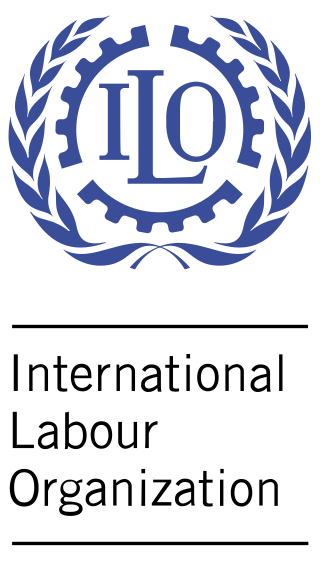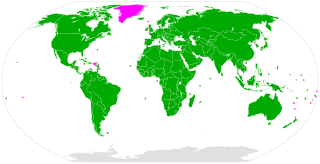Related Research Articles

The International Labour Organization (ILO) is a United Nations agency whose mandate is to advance social and economic justice by setting international labour standards. Founded in October 1919 under the League of Nations, it is one of the first and oldest specialized agencies of the UN. The ILO has 187 member states: 186 out of 193 UN member states plus the Cook Islands. It is headquartered in Geneva, Switzerland, with around 40 field offices around the world, and employs some 3,381 staff across 107 nations, of whom 1,698 work in technical cooperation programmes and projects.

Child labour is the exploitation of children through any form of work that interferes with their ability to attend regular school, or is mentally, physically, socially and morally harmful. Such exploitation is prohibited by legislation worldwide, although these laws do not consider all work by children as child labour; exceptions include work by child artists, family duties, supervised training, and some forms of work undertaken by Amish children, as well as by Indigenous children in the Americas.

Productivity is the efficiency of production of goods or services expressed by some measure. Measurements of productivity are often expressed as a ratio of an aggregate output to a single input or an aggregate input used in a production process, i.e. output per unit of input, typically over a specific period of time. The most common example is the (aggregate) labour productivity measure, one example of which is GDP per worker. There are many different definitions of productivity and the choice among them depends on the purpose of the productivity measurement and data availability. The key source of difference between various productivity measures is also usually related to how the outputs and the inputs are aggregated to obtain such a ratio-type measure of productivity.

The Convention Concerning the Prohibition and Immediate Action for the Elimination of the Worst Forms of Child Labour, known in short as the Worst Forms of Child Labour Convention, was adopted by the International Labour Organization (ILO) in 1999 as ILO Convention No 182. It is one of eight ILO fundamental conventions.
A predetermined motion time system (PMTS) is frequently used to perform labor minute costing in order to set piece-rates, wage-rates or incentives in labor oriented industries by quantifying the amount of time required to perform specific tasks under defined conditions. Today the PMTS is mainly used in work measurement for shorter cycles in labour oriented industries such as apparel and footwear. This topic comes under wider industrial and production engineering. One of such a system is known as "work factor" and more popular methods-time measurement (MTM), released in 1948 exist today in several variations and used in some commercial applications.
Private sector development (PSD) is a term in the international development industry to refer to a range of strategies for promoting economic growth and reducing poverty in developing countries by building private enterprises. This could be through working with firms directly, with membership organisations to represent them, or through a range of areas of policy and regulation to promote functioning, competitive markets.

Decent work is employment that "respects the fundamental rights of the human person as well as the rights of workers in terms of conditions of work safety and remuneration. ... respect for the physical and mental integrity of the worker in the exercise of their employment."

ISO 22000 is a food safety management system by the International Organization for Standardization (ISO) which is outcome focused, providing requirements for any organization in the food industry with objective to help to improve overall performance in food safety. These standards are intended to ensure safety in the global food supply chain. The standards involve the overall guidelines for food safety management and also focuses on traceability in the feed and food chain.

Labor relations or labor studies is a field of study that can have different meanings depending on the context in which it is used. In an international context, it is a subfield of labor history that studies the human relations with regard to work in its broadest sense and how this connects to questions of social inequality. It explicitly encompasses unregulated, historical, and non-Western forms of labor. Here, labor relations define "for or with whom one works and under what rules. These rules determine the type of work, type and amount of remuneration, working hours, degrees of physical and psychological strain, as well as the degree of freedom and autonomy associated with the work." More specifically in a North American and strictly modern context, labor relations is the study and practice of managing unionized employment situations. In academia, labor relations is frequently a sub-area within industrial relations, though scholars from many disciplines including economics, sociology, history, law, and political science also study labor unions and labor movements. In practice, labor relations is frequently a subarea within human resource management. Courses in labor relations typically cover labor history, labor law, union organizing, bargaining, contract administration, and important contemporary topics.

Albert Thomas was a prominent French Socialist and the first Minister of Armament for the French Third Republic during World War I. Following the Treaty of Versailles, he was nominated as the first Director General of the International Labour Office, a position he held until his death in 1932. As Director-General, he was succeeded by Harold Butler.

Tripartism is an economic system of neo-corporatism based on a mixed economy and tripartite contracts between employers' organizations, trade unions, and the government of a country. Each is to act as a social partner to create economic policy through cooperation, consultation, negotiation, and compromise. In Tripartism, the government has a large role in the economy and engages in negotiations between labour unions and business interest groups to establish economic policy.

Industrial engineering is an engineering profession that is concerned with the optimization of complex processes, systems, or organizations by developing, improving and implementing integrated systems of people, money, knowledge, information and equipment. Industrial engineering is central to manufacturing operations.
The Swedish Workplace HIV/AIDS Programme (SWHAP) is a joint initiative by the International Council of Swedish Industry (NIR) and the Swedish Industrial and Metalworkers’ Union. The SWHAP concept is based on close co-operation between the company management, the local trade union branches and workers' representatives. The programme contributes to the establishment and support to HIV and AIDS programmes at Swedish companies and their partners in Sub-Saharan Africa. In 2010, SWHAP supported close to 90 workplaces directly and reached out to 20,000 employees, yet benefiting far more if taking into account the families and surrounding communities. The programme presently operates in Botswana, Kenya, Namibia, Nigeria, Rwanda, South Africa, Tanzania, Uganda, Zambia and Zimbabwe. SWHAP is financed by the Swedish International Development Cooperation Agency, Sida.
PIACT is an acronym for programme developed by the International Labour Organization for improvement of occupational health and safety. The acronym is derived from its French name Programme international pour l'amélioration des conditions et du milieu de travail (PIACT), but it is also widely known under its English name Programme for the Improvement of Working Conditions and Environment.
Kazutaka Kogi is a Japanese academic known for his contributions to simple, low-cost interventions in small manufacturing enterprises that improve the working conditions for the employees and at the same time also improve the overall productivity of the workforce.

Occupational safety and health (OSH) or occupational health and safety (OHS) is a multidisciplinary field concerned with the safety, health, and welfare of people at work. OSH is related to the fields of occupational medicine and occupational hygiene and aligns with workplace health promotion initiatives. OSH also protects all the general public who may be affected by the occupational environment.

Ergonomics, also known as human factors or human factors engineering (HFE), is the application of psychological and physiological principles to the engineering and design of products, processes, and systems. Primary goals of human factors engineering are to reduce human error, increase productivity and system availability, and enhance safety, health and comfort with a specific focus on the interaction between the human and equipment.
Statistics on unemployment in India had traditionally been collected, compiled and disseminated once every ten years by the Ministry of Labour and Employment (MLE), primarily from sample studies conducted by the National Sample Survey Office. Other than these 5-year sample studies, India had historically not collected monthly, quarterly or yearly nationwide employment and unemployment statistics on a routine basis. In 2016, the Centre for Monitoring Indian Economy, a non-governmental entity based in Mumbai, started sampling and publishing monthly unemployment in India statistics. Despite having one of the longest working hours, India has one of the lowest workforce productivity levels in the world. Economists often say that due to structural economic problems, India is experiencing jobless economic growth.
Child labour laws are statutes placing restrictions and regulations on the work of minors.
Bangladesh Homeworkers Women Association, also known as BHWA, is an NGO, headquartered in Dhaka, Bangladesh. It is mostly known for working with the underprivileged homeworkers, also known as home-based workers by initiating social awareness programs, advocacy workshops, originating policy drafts, development and recommendation. BHWA focuses on key issues such as the elimination of child labour, female labourers' rights in the informal sector, occupational health and safety for women workers who are not covered by the Labour Code in Bangladesh.
References
- Krungkraiwong, Sudthida; Toru Itani; Ratanaporn Amornratanapaichit (2006). "Promotion of a Healthy Work Life at Small Enterprises in Thailand by Participatory Methods". Industrial Health. 44 (1): 108–111. doi: 10.2486/indhealth.44.108 . PMID 16610544 . Retrieved 3 Sep 2009.
- Kogi, Kazutaka (1997). "Ergonomics and technology transfer into small and mediumsized enterprises". Ergonomics. 40 (10): 1118–1129. doi:10.1080/001401397187649.
- Thurman, Joseph E. (1993). On business and work. International Labour Organization. ISBN 978-92-2-108252-1.
- de Givry, J (1978). The ILO and the Quality of Working Life-A New International Programme: PIACT. International Labour Review.